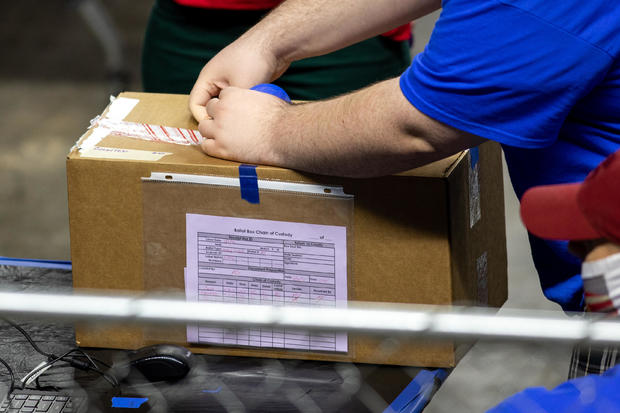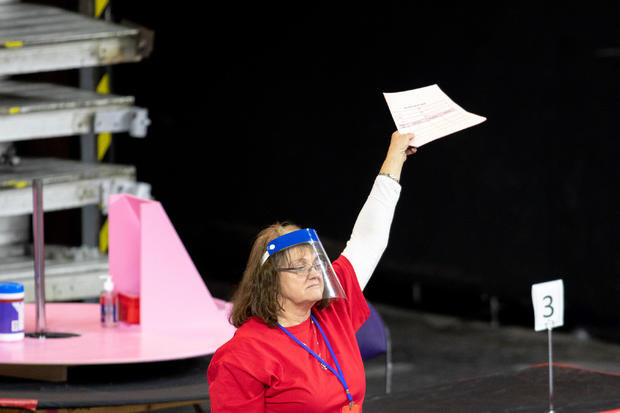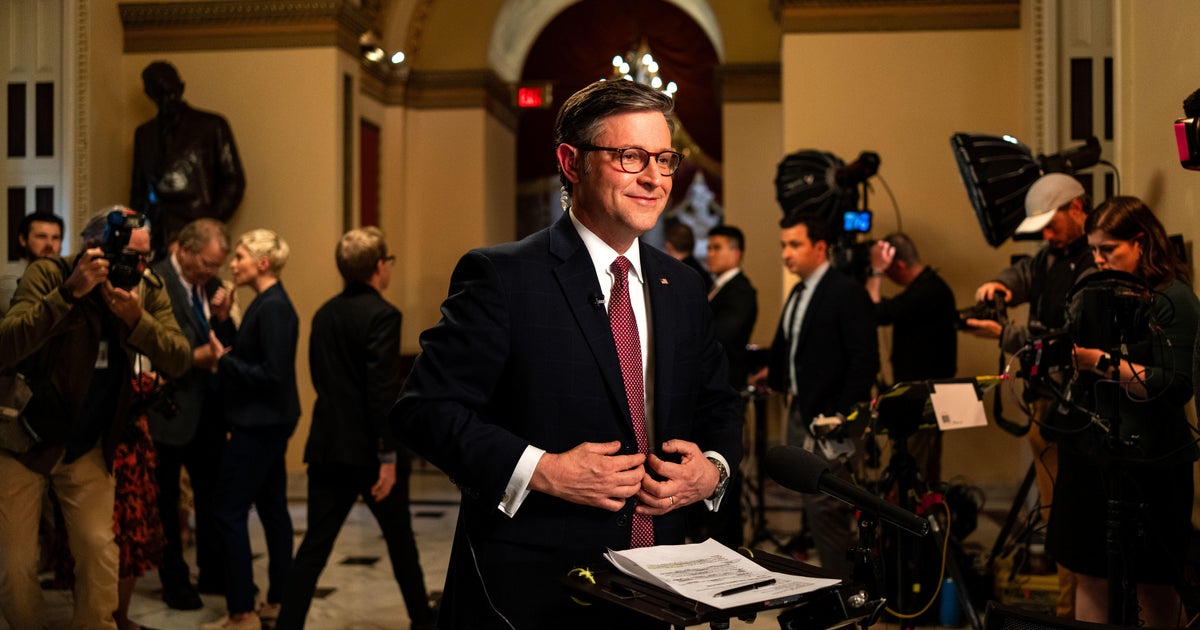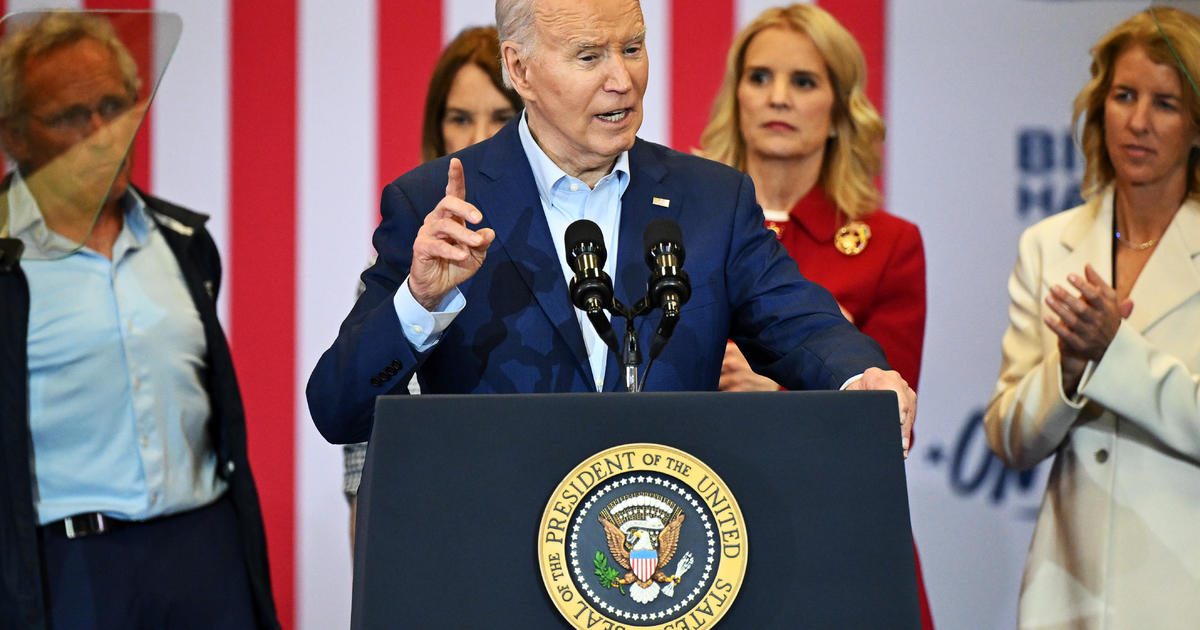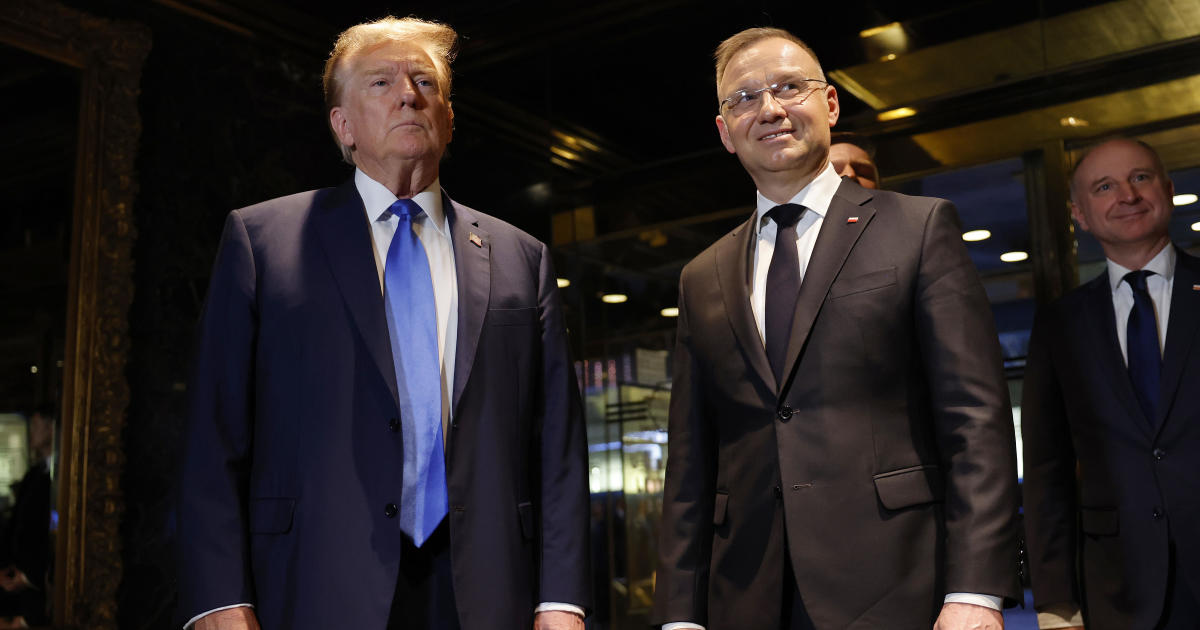The Arizona GOP's Maricopa County audit: What to know about it
More than six months after his defeat in the November election, former President Trump is still claiming victory, calling the election "the big lie," despite several recounts and dozens of unsuccessful lawsuits that say otherwise.
Although every state has certified its results, the Republican-controlled state Senate in Arizona has undertaken a full hand recount and audit of the ballots and voting machines in Maricopa, the state's largest county, a move that has been frequently praised by the former president. President Biden won the county, a longtime Republican stronghold, by 45,109 votes, and he won the state by 10,457 votes. At the same time, Democrats also picked up a U.S. Senate seat from Arizona.
By subpoena, the state Senate took possession of 2.1 million ballots and nearly 400 election machines and turned them over to be audited by companies that include one whose CEO promoted debunked election fraud theories after the election. The majority-Republican county board of supervisors vehemently objected to the action and pointed to the multiple audits of ballots and machines that Arizona had already completed that had found no issues.
Election officials and experts fear the action taken by Arizona Republicans to flout the certified results might set an example for partisans in other states and could end up undermining Americans' confidence in elections. Right-wing Representative Marjorie Taylor Greene, of Georgia, is calling for an audit in her state, too, which also backed Joe Biden. Georgia already recounted its ballots twice, including once by hand.
Concerns about the audit have reached the U.S. Justice Department, which sent a letter to Arizona Senate President Karen Fann to warn about "potential non-compliance with federal laws," including, among other issues, whether ballots are being "adequately safeguarded."
"Past experience with similar investigative efforts around the country has raised concerns that they can be directed at minority voters, which potentially can implicate the anti-intimidation prohibitions of the Voting Rights Act," wrote Pamela S. Karlan, Principal Deputy Assistant Attorney General of the Civil Rights Division. "Such investigative efforts can have a significant intimidating effect on qualified voters that can deter them from seeking to vote in the future."
Fann's office said the state Senate's election attorney is preparing a response.
"It's designed to confuse people, it's designed to create further doubt in the mind of the loser's supporters," said election attorney David Becker of the efforts in Arizona. "It's about as bad as it gets, and the real loser here is American democracy."
Here are the facts about what's going on in Arizona:
Whatever the outcome, the Senate's count will not change the results of the election.
The county results were already certified by the board of supervisors, and Republican Governor Doug Ducey certified the statewide results.
Chris DeRose, an Republican Arizona election law attorney, wrote in a Washington Post op-ed that "no good can come" from the Senate's efforts. "How could anyone expect a partisan process to yield a result more accurate and trusted than the one administered by professionals of all parties following established rules?"
It is unclear how long it will take to count the ballots, but the space where the audit is taking place, the Arizona Veterans Memorial Coliseum, has only been leased until May 14. As of Wednesday morning, only 200,000 ballots of the 2.1 million had been counted, according to Ken Bennett, a former GOP secretary of state and the Senate's audit liaison.
The pandemic did not significantly alter the way Arizona conducts elections.
Unlike other states that had to quickly expand voting options in light of the pandemic, Arizona has had vote-by-mail in place since 1991. Most Arizonans are accustomed to voting by mail, and drop boxes were already in place, so the state was equipped to handle the volume of ballots.
In 2016, when Mr. Trump won the state by about 91,000 votes, about 76% cast their ballot early or by mail, according to data from the secretary of state's office. In 2020, about 88% voted early or by mail. There was one substantial adjustment for the pandemic: a judge ruled that voters who had returned a mail ballot without a signature could fix that issue until 5 p.m. on the fifth day after the election.
In addition, in order to accommodate in-person voting safely in 2020, and in light of a poll-worker shortage, Maricopa County instituted a vote center model — allowed under Arizona law — that enabled voters to go to a large centrally located place to cast ballots, rather than to their precincts.
The tight presidential race meant that more time was needed to count the ballots; Maricopa County certified the results on November 20.
Despite Mr. Trump's loss, Republicans were successful in other races in the state, including in Maricopa County.
Republicans won almost every countywide election in November, and the GOP maintained a 4-1 majority on the county board of supervisors.
Maricopa County has already conducted multiple audits of the 2020 election.
Before and after every election, it's standard procedure in the county to conduct a "logic and accuracy" test on election equipment. In 2020, those tests turned up no issues. State law also mandates a hand-count audit of a statistically significant sample of ballots after each election to be compared to the machine count. That, too, came up with 100% accuracy, according to county election officials.
In January, after waves of protests, the Maricopa County Board of Supervisors approved two additional audits of election equipment. The board hired two independent firms, Pro V&V and SLI Compliance, which are certified by the U.S. Elections Assistance Commission. The firms conducted their separate audits in February and found no issues.
The audits included tests for malicious software and hardware, source codes, network and internet connectivity, and accuracy to detect vote switching. Observers from both parties were invited to attend, and the audits were live streamed.
Questions have been raised about Cyber Ninjas, the company leading the recount and audit.
Senate Republicans in Arizona hired several firms to conduct the new audit, and chose Cyber Ninjas, a cybersecurity firm, to lead it. The state lawmakers called the contractors a "qualified team" who had been selected after "months of interviewing forensic auditors." Cyber Ninja's website touts its consulting services on software application security but does not mention expertise in conducting election audits.
The CEO of Cyber Ninjas, Doug Logan, has previously promoted the unsupported theory that there was fraud in the 2020 election, according to a review by the Arizona Mirror of his now deleted Twitter account. The Mirror also reported that Logan authored a document on former Trump campaign lawyer Sidney Powell's website with untruthful allegations of fraud concerning Dominion Voting Systems. In a statement given to the Arizona Mirror, Logan stood by the document and the assertions in it, among them, the false claim that Dominion Voting Systems has links to the late Venezuelan dictator Hugo Chavez.
Early in April, Logan said in a statement about questions regarding whether he was biased, "The big question should not be, 'Am I biased,' but,' 'Will this audit be transparent, truthful and accurate?' The answer to the latter question is a resounding 'Yes.'" Cyber Ninjas has not responded to CBS News' request for comment.
"They have hired a firm with zero experience in elections, whose subcontractors have zero experience in elections outside of some rejected testimony in 'Stop the Steal' efforts," Becker said.
Cyber Ninjas issued a statement late last month in which Logan claimed "each member of our team has been part of election audits, including Cyber Ninjas, which was part of election audits in Michigan and in Georgia." But officials in those states told CBS News that Cyber Ninjas wasn't involved in any of the audits carried out by election officials.
During a press briefing in April, Bennett, asked about Logan's bias, told reporters, "we're not here to audit Mr. Logan's opinions about anything or anybody else's opinions. We're here to audit the ballots, envelopes, everything that was involved in the Maricopa election in November of 2020." At the same briefing, Logan said he "won't touch a single ballot."
Election experts are also concerned about the audit's treatment of conspiracy theories promulgated during the election.
Tammy Patrick, a former elections official in Maricopa County, said the audit includes a "high-level forensic analysis of the paper" and workers are "keeping track of folds on ballots," to check to see if ballots were actually mailed, even though Patrick noted that not all mail ballots end up with folds. She said examining the folds and paper helps "fuel and continue a narrative of some of the conspiracies."
John Brakey, an official helping oversee the audit, told CBS station KPHO Wednesday that workers are examining ballots to "find out if there's bamboo in the paper." That stems from a baseless conspiracy theory that 40,000 ballots were flown into Arizona from Asia and stuffed into ballot boxes. Brakey said he didn't believe that theory about ballots shipped from Asia, but examining them is "part of the mystery that we want to un-gaslight people about."
Election experts are also wondering if UV light being used to examine the ballots, according to procedures in one document, could damage them. A debunked conspiracy theory claimed Mr. Trump put watermarks on ballots to prevent cheating. The Maricopa County Elections Department issued a statement affirming there are no watermarks on ballots.
Arizona's Democratic Secretary of State Katie Hobbs, in a letter she sent to Bennett this week, said using UV lights, measuring ballot thickness, examining folds, and looking at the makeup of the paper are "completely unnecessary steps if the goal of the audit is to validate the election results."
"Though conspiracy theorists are undoubtedly cheering on these types of inspections — and perhaps providing financial support because of their use — they do little other than further marginalize the professionalism and intent of this 'audit,'" Hobbs added.
Election officials aren't involved in Cyber Ninja's review of the ballots and machines.
The Republican-led board of supervisors has already certified the election results and deemed its own additional audits sufficient. In response to a subpoena from the state Senate, the board argued the legislature had no right under state law to access private ballots and election machines. The GOP-led Senate tried to hold the board in contempt, but fell a vote short.
In February, Maricopa County Superior Court Judge Timothy Thomason sided with the state Senate, ordering the board to turn over the ballots and tabulating machines. The board complied the the court order but has had no other role in the effort.
"Board members recognize that administering elections is nonpartisan. The preparations and processes have to be fair to all parties and people," Maricopa County communications director Fields Moseley told CBS News. "It would be unfortunate if the antics and false allegations of people who didn't like the results lead voters to question a system that is designed to be fair."
Hobbs has also had no role in the Senate's latest audit. In March, she asked state Senate Majority Leader Karen Fann for observer access to count and offered recommendations for audit experts. Hobbs said she received no response. A court recently ruled Hobbs could send observers to view the process.
Election experts are troubled by the way ballots are being handled during the audit.
They say proper procedures aren't in place to create a chain of custody, raising concerns about whether ballots are being tampered with, which could damage their integrity as records of the election.
For example, on the first day of the audit, a local reporter noted that workers were equipped with blue-ink pens, which are prohibited by the Arizona election procedures manual during hand counts because marks on the ballots would be indistinguishable from a voter's marks. The blue-ink pens were swapped out for red-ink pens before any ballots were taken out of the boxes.
Hobbs, alarmed by what she has learned about the audit since her office has been allowed to observe it, wrote a letter to Bennett this week, outlining her concerns. Hand-counting ballots, she warned, is a process that can be "fraught with error." She drew attention to some of the shortcomings in Cyber Ninja's approach, including its timeline, its less-than-comprehensive description of the procedures it would use in the audit and its lack of specificity about how it would determine voter intent.
Hobbs was also worried about machines that weren't properly tested, Cyber Ninja's insufficient detail about how the recounted vote batches would be aggregated and how the audit would ensure ballots remain in the correct batches.
In the limited time that observers from the Arizona secretary of state's office have been given access to the audit, Hobbs wrote that they have already witnessed inadequate physical security of the ballots, computers left unattended, a risk of double-counting ballots and observed rules that are changing regularly. They also took note of workers who "appear to be violating the procedures" and said "there is an inexplicable disregard for best security practices."
After the letter was sent, the audit's Twitter account tweeted that Hobbs "continues to make baseless claimes (sic) about this forensic audit."
Matthew Masterson, former chairman of the Election Assistance Commission and former senior cybersecurity adviser at the Department of Homeland Security, told reporters on Tuesday there have been some procedural improvements since the media was allowed some access and more observers were allowed in. But he also suggested that improvements in ballot handling may simply have come too late.
"Just from a legal standpoint, chain of custody, ballot integrity has been so destroyed by a lack of procedures that moved into evolving procedures," Masterson said.
Washington Republican Secretary of State Kim Wyman wonders who would be held accountable if a ballot goes missing or is altered. She pointed out that usually, election officials start building a chain of custody and audit trail for ballots as part of the requirement to keep federal election ballots and ballot materials on hand for 22 months after an election.
So, if there's a court order or mandated requirement to go back and review the records and ballots, election officials are supposed to be able to show that no one has touched the ballots since they were sealed. Those sealed ballots can then be used to refute any false claims about an election, Wyman said. As she sees it, the review in Maricopa County has created questions about that security because they don't "reach anywhere near knocking-on-the-door of standards that election officials operate to."
"How do you know those ballots weren't altered? And it doesn't even matter if they were at this point because I don't think you can guarantee that they weren't," Wyman said. "I have no confidence as an election official that any of those ballots are legitimate now. None. Because there is no way you could verify it."
Bennett did not respond to CBS News' questions about Wyman's statement or Hobbs' letter outlining her concerns.
It is not clear who is paying for this audit.
There are questions about who is funding the audit. The Arizona Senate is chipping in $150,000, but Logan and Bennett have not disclosed who else is paying for it. The Senate's contribution would only cover a fraction of the cost of an effort that could go on for weeks. They're getting some help from a host at the pro-Trump One America News Network who's helping to raise some of the money. Another entity, called The American Project, is trying to raise $2.8 million for the audit. By Wednesday, it had raised over $1.5 million.
"There are organizations, individuals, people across the country, who are interested in the same things," Bennett said during a briefing with reporters last month. "It doesn't matter who paid for it."
